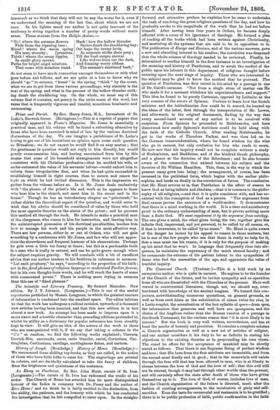Priest and Parish. By Rev. Harry Jones, M.A., Incumbent of
St. Luke's, Berwick Street. (Rivingtons.)—This is a reprint of papers that originally appeared in Fraser's Magazine. Mr. Jones is essentially a practical man, and his volume will be found a refreshing alterative by those who have been exercised in mind of late by the various doctrinal discussions of the day. We can imagine a parishioner of St. Luke's trying to get out of his incumbent an opinion upon some such question as Ritualism; we do not expect he would find it an easy matter ; that the gentleman in question would not reply to him directly, bat would gently cross-examine him, and having ascertained from him by this means that some of his household arrangements were not altogether consistent with his Christian profession—that he scolded his wife, or under-estimated the value of his servants' labour—would exhort him to reform these irregnlarities first, and when he had quite succeeded in establishing himself in right courses, then to return and renew the topic on which he had invited discussion. This is the impression we gather from the volume before us. In it Mr. Jones deals exclusively with "the phases of the priest's life and work as he appears to those who hear him in the church, and meet him in the street and in the house." Though he has an introductory chapter on "priestcraft," he rather shirks the theoretical aspect of the question, and would seem to wish that his advice should be considered of value by those who hold the most opposite theories on the status of the priest ; and he pursues this method all through the book. He intends to make a practical man of the clergyman who comes to him for instruction, and leaving him in the uninterrupted possession of his doctrinal peculiarities, teaches him how to manage his work and his people in the most effective way. There are few persons, either in or out of Orders, who will not gain something by a conference with Mr. Jones, and few who will not appre- ciate the shrewdness and frequent humour of his observations. Perhaps he gets even a little too funny at times ; but this is a pardonable fault in a man who is really in earnest, and can be quite grave enough when the subject requires gravity. We will conclude with a bit of excellent advice that our author tenders to his brethren in reference to sermons. "Let each prophesy," he says," according to the proportion of his faith; not in the finedphrases of religious language or modernized Pauline fervour, bat in his own thought-born words, and he will reach the hearts of some with consecrated power." There is nothing more trying in sermons than this use of "fixed phrases."






























 Previous page
Previous page